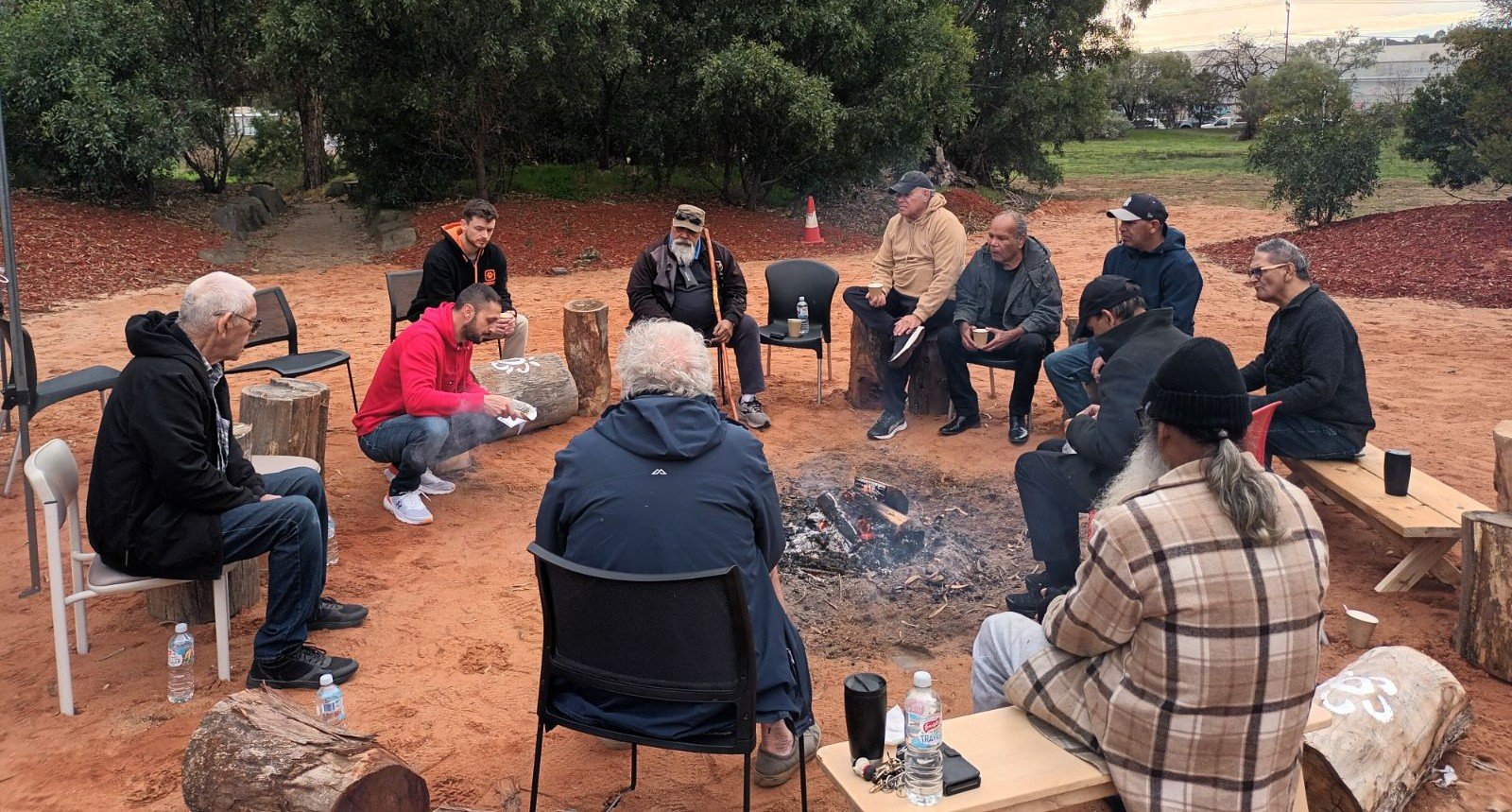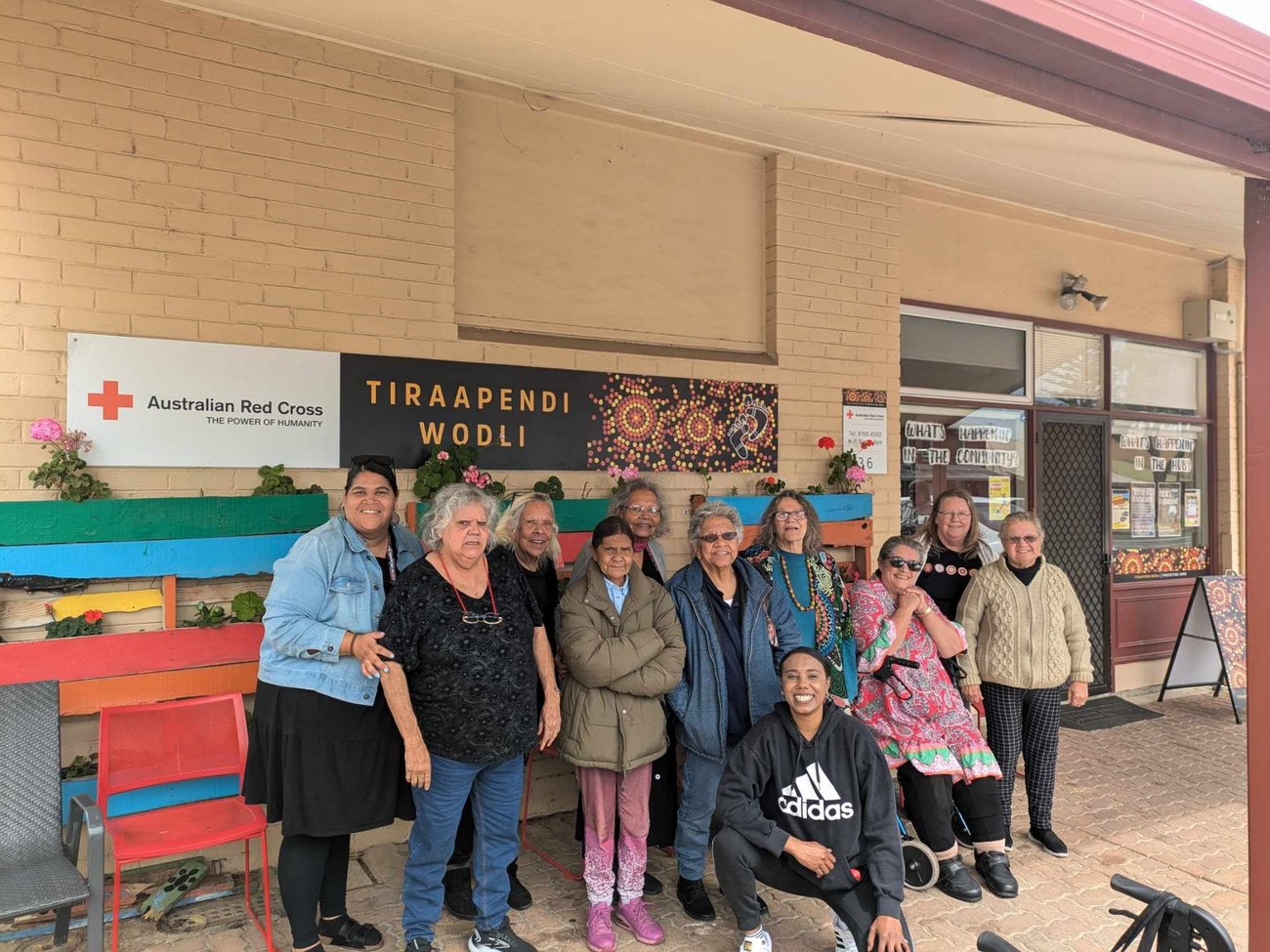
Spotlight: Community connection at the Tiraapendi Wodli Hub
Port Adelaide Local Drug Action Team (LDAT) runs weekly gatherings for Aboriginal men and women at the Tiraapendi Wodli Hub, supporting attendees to build cultural connections, as well as learn about local health and support services.
To date, the LDAT has delivered multiple Community Action Plans (CAPs), aimed at preventing and reducing alcohol and other drug related harm among Aboriginal community members.
It’s led by Red Cross Port Adelaide, in partnership with Tiraapendi Wodli, and supported by multiple local organisations – including Port Adelaide Enfield Council, Ocean View College, Flinders Wellbeing Centre, Uniting SA and Anglicare’s ‘The Arches’ Bail Accommodation Service.
The challenge
While the LDAT mainly works with residents in the Port Adelaide Enfield Council area, they also have people travelling in from places like Port Augusta, Ceduna or further south.
Many people attending the Hub’s gatherings are coming out of the justice system and facing socio-economic pressures. They might be lonely, feel disconnected from culture and community, and not able to access the supports they need – all known risk factors for alcohol and drug harms.
The LDAT’s Red Cross spokesperson, Simon Talanskas, explains that there’s a lot of mistrust of services within the Aboriginal community because of negative experiences over time, compounding this disconnection.
“Quite often, Aboriginal people will go to a service and hear: ‘no’.
“It’s rejection after rejection. By the time they come to the Hub, they’ve heard ‘no’ quite a few times.
“So, we say: ‘do you need something to eat... what’s your story?’ We have a conversation, and we can refer them on to a service that we have a relationship with.”
The solution
Building trust with community and creating a space where attendees feel safe is key to the program.

The weekly gatherings are a safe place for Aboriginal people to attend regularly. A place where they can ask for help – ranging from needing a bus ticket to getting to an appointment, to crisis support – as well as learn from guest speakers and services. For example, recently a psychologist from Flinders Wellbeing visited the Hub.
“For the men's gathering, we start with a big breakfast together and then we sit down and have an informal yarn about services that are available to them, from financial counsellors, legal services, and health services.”
“Sometimes, it’s the first proper meal someone’s had that week. But more than food, it’s a place where men can sit together, feel respected, share yarns, share stories. It’s giving people that basic dignity.”
Simon shares that people often say they feel relaxed and at home at the Tiraapendi Wodli Hub. There are photos up in the kitchen of participants and events, so people often see photos of themselves or a family member when they walk in.
“Once people do start to open up, there might be a range of crises that need addressing. The men’s gatherings are a good introduction to the Hub – then as people get more comfortable, they can connect with staff to get the support they need.”
To extend its reach, the LDAT also holds bigger celebrations throughout the year, including street barbeques, with a focus on cultural connection.
The progress
The LDAT is now delivering it’s fourth CAP on this project.
When it started, there were two to three men coming to the weekly gatherings. It’s grown quickly, with up to 35 now attending weekly.
Last year, the LDAT organised eight community-led sessions and events around alcohol and other drug use, family disconnection, parenting, relationships and trauma.
It had aimed to host four events but extended its event calendar due to demand.
Events included a community celebration and barbecue, Reconciliation Week yarning circles, Ngarrindjeri region and Victor Harbor trip, Riverland trip to meet with Aboriginal women’s group and attend a cultural day, fire-pit yarning circles with intergenerational storytelling, Nunga Week including a Tiraapendi Wodli Awards celebration, a women's healing workshop and a Christmas celebration.
More than 100 locals attended the sessions – almost double their target of 60 attendees.
Evaluation from the LDAT’s latest CAP shows that 88% of participants who attended a community celebration said it contributed to their feelings of connection to community and culture - a strong protective factor against alcohol and other drug-related harm.
And, 83% reported that the event contributed to their feelings of connection to local Aboriginal community and culture – higher than the target of 70%.
One young person shared their thoughts after the fire-pit yarning circle, where they connected with Elders.
“I’ve never done anything like this, to continue to learn about my culture from others would be great to do every term.”
Another community member felt it was important to have these events to celebrate families and communities.
“Usually, the only time we come together is for sadness at funerals. This reminds everyone, and especially our kids, that we can be proud and laugh and celebrate who we are too.”
The Tiraapendi Wodli Hub often hears stories about how the LDAT’s activities have turned lives around.
“The best example was of one woman who was homeless and with substance use issues. Over a two-year stretch, she’d come into the Hub regularly. We just kept planting that seed about rehab and how it could help her turn the corner,” said Simon.
“It took three or four goes before she successfully finished a rehabilitation program. Then a year or two down the track, she got work and her own house.”
And the impact extended beyond the individual to her family members as well.
“Then, she referred her family here. I think by the end of that four- or five-year process, she was able to support about 19 people in her family.”
“There truly is that ripple effect. When you can give people the skills and confidence to build themselves up, then they can pass it on to friends and family and keep the momentum going.”
Advice for other LDATs
In mid-2025, the Port Adelaide LDAT was celebrated at the launch of the 2025 LDAT Showcase Report at Parliament House in Canberra.
Simon shared that it was a privilege to tell the story of his LDAT, hoping that his insights on the successful program would motivate others to try a similar approach.
He emphasised the importance of prevention as the right approach for LDATs.
“If we can educate and show communities how to make the right choices, it does break the cycle and does makes lives a lot easier. It opens up opportunities for families, education and whatever they are striving for.”
He also stressed that working with local partner organisations is vital – the Port Adelaide LDAT truly operates as a team.
“We can’t do it ourselves. A big thing we do is system navigation – linking people in with the right service.
“It’s an honour as a non-Indigenous person to work in the space. The majority of our team is Aboriginal, so to be able to walk alongside community to support them through some pretty vulnerable situations is truly humbling, as well as helping other stakeholders to support Aboriginal communities.”

